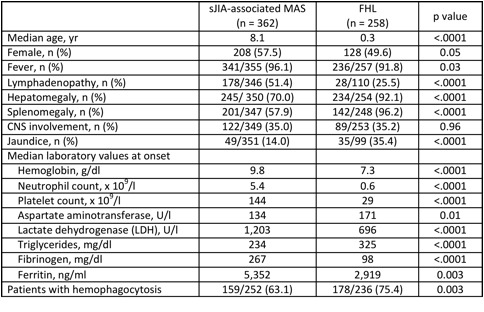Session Information
Date: Monday, November 9, 2015
Session Type: ACR Poster Session B
Session Time: 9:00AM-11:00AM
Background/Purpose: Macrophage activations syndrome (MAS) is a potentially
life-threatening complication of systemic
juvenile idiopathic arthritis (sJIA). It is common
view that sJIA associated MAS bears a close clinical
resemblance to the group of hemophagocytic lymphohistiocytosis (HLH), including familial HLH (FHL).
This has led to suggest the use of the HLH-2004 guidelines to diagnose MAS in sJIA. However, MAS develops in the context of an underlying
highly inflammatory condition, whereas FHL is a primary disorder with genetic
basis. It is thus conceivable that some differences exist in the clinical
expression and severity of the two conditions. However, their clinical picture
has previously been compared only in small studies. The aim of our study was to
compare the demographic, clinical, laboratory and histopathologic
features of sJIA-associated MAS and FHL.
Methods : Data on sJIA associated MAS were collected
by both pediatric rheumatologists and pediatric hemato-oncologists in a
large multinational collaborative effort. Data on FHL patients were gathered
from the HLH-94 and HLH-2004 trials. Clinical and laboratory features at
disease onset were compared between by means of Mann-Whitney U test or
chi-square/Fisher exact test, as appropriate.
Results : A total of 620 patients were enrolled: 362 (58.4%) sJIA-associated
MAS and 258 (41.6%) FHL. The main differences in demographic, clinical,
laboratory and histopathologic features between the two patient groups
are presented in Table 1.
Conclusion : Although MAS and FHL showed similar clinical features and laboratory
abnormalities, the frequency of most clinical manifestations and the severity
and trend of laboratory changes were different. FHL patients had greater
frequency of hepatosplenomegaly and more profound cytopenia, hypofibrinogenemia and
hypertransaminasemia, whereas MAS patients had higher
levels of ferritin and LDH. The prevalence of CNS disease was comparable
between the two groups. Hemophagocytosis was detected
more commonly in FHL. The observed differences suggest the use of different
diagnostic criteria for the two conditions.
To cite this abstract in AMA style:
Minoia F, Horne A, Davì S, Bovis F, Rosina S, Lehmberg K, Weitzman S, Insalaco A, Wouters C, Shenoi S, Espada G, Ozen S, Anton J, Khubchandani R, Russo R, Ruperto N, Martini A, Cron RQ, Ravelli A. Macrophage Activation Syndrome and Familial Hemophagocytic Lymphohistiocytosis: Is Their Clinical Phenotype Really Similar? [abstract]. Arthritis Rheumatol. 2015; 67 (suppl 10). https://acrabstracts.org/abstract/macrophage-activation-syndrome-and-familial-hemophagocytic-lymphohistiocytosis-is-their-clinical-phenotype-really-similar/. Accessed .« Back to 2015 ACR/ARHP Annual Meeting
ACR Meeting Abstracts - https://acrabstracts.org/abstract/macrophage-activation-syndrome-and-familial-hemophagocytic-lymphohistiocytosis-is-their-clinical-phenotype-really-similar/

